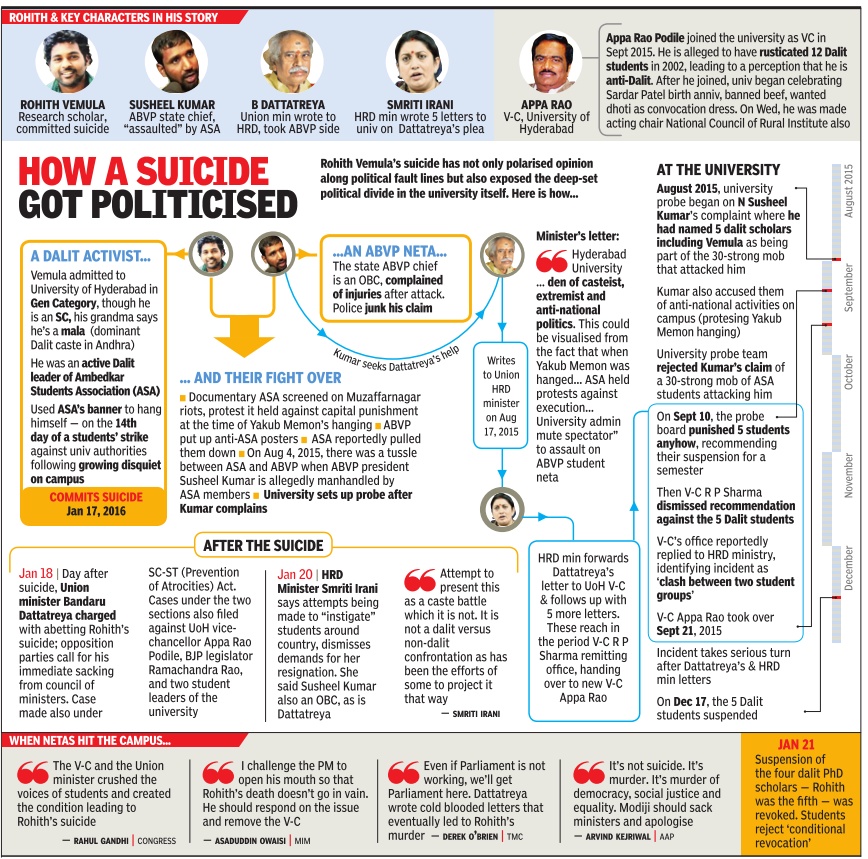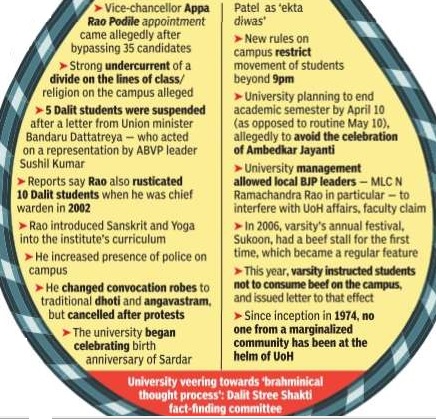University of Hyderabad


This is a collection of articles archived for the excellence of their content. |
Contents |
Caste tension on the campus
The Times of India, Jan 22 2016
Kingshuk Nag
Hyd univ itself a case study in caste politics
A little over two years ago, in December 2013, Nobel laureate Amartya Sen was invited by the University of Hyderabad (UoH) to accept an honorary doctorate and deliver a talk on an esoteric subject: `Are Coffee Houses Important for Education?' But protesting students -mainly Dalits -would just not allow Sen to talk on this subject. Holding placards and armed with black bands, the students declared that the Nobel laureate rather speak on discrimination against Dalits on university campuses even as cries of Jai Bheem' and `They want us to die' rent the auditorium. The protests came against the backdrop of suicides of two Dalits on the campus earlier that year -including one that had taken place three weeks before Sen's talk. Ultimately the protesters allowed the nonplussed Sen to speak but not before interrogating him why had he accepted the honorary doctorate from a vice-chancellor who resorted to “discrimination“ on the campus.
“What you saw that day was a Dalit reaction to decades of discrimination against them on the campus. Andhra Pradesh's has been a highly feudal society and I have been on this campus for 20 years and can assert that there is institutionalised caste discrimination,“ says a professor who hails from elsewhere.
Concurs a Dalit IPS officer from Andhra Pradesh: “I have studied in Jawaharlal Nehru University and although Dalits are on the receiving end everywhere it is nothing like the kind seen at UoH.“
Most of the Dalit students come from rural areas with little knowledge of English, which is the university's medium of instruction. “They find themselves somersaulted to a totally alien environment with nobody to help,“ says social activist Anant Maringanti. “Many higher caste profes sors instead of helping them openly chide them for being worthless,“ confides an OBC professor of the UoH.
Delays in disbursement of scholarships and fellowships is common on UoH campus and this affects Dalit students more as they come from poor backgrounds. Part of the scholarship money of a Dalit student is often sent to the family.
With growing Dalit consciousness, the Ambedkar Students Association (ASA) was formed a few years ago. But to broadbase its support, ASA included all those who felt discri minated against, including pu pils from the northeast and Muslims. For one year the head of ASA was also a Brahmin student. Rohith Vemula star ted with SFI and shifted allegi ance to the ASA, which often took up larger issues beyond Dalit discrimination. Now the Dalit students have become very strident and a progressive professor remembers how a Dalit student when rebuked for poor research work walked out after unfairly calling him “you bloody Brahmin“.
Analysts say that this sort of conflict and disputes are bound to happen in campuses in a society in transition. But what has further complicated issues is the growing assertion by the ABVP on the campuses after a BJP government took charge in New Delhi.
2007-2016: 9 SC suicides
The Times of India, Jan 19 2016
Preeti Biswas
9 Dalit suicides in 10 years underscore caste politics
Rohith Vemula isn't the first Dalit scholar to commit suicide on the University of Hyderabad (UoH) campus. Over the last decade, eight Dalits have reportedly ended their lives, unable to handle what has been termed as caste politics. The suicides highlight the pronounced discrimination existing against students from marginalised communities at the UoH, said Hyderabad educationists.
“Eight suicides is not a small number, but the university has still not woken up. Rohith's death only highlights a larger issue of caste-based discrimination prevailing on campus,“ said Zuhail KP , president of the UoH Students Union, said on Monday .
Vemula's death has also brought to the fore certain unsavoury issues which students allege the administration has been brushing under the carpet for years.
In 2013, M Venkatesh, a PhD scholar, ended his life owing to discrimination against Dalit students on the campus. In view of the growing number of Dalit suicides at UoH, educationists and students blamed it on lack of financial assistance and absence of a support system to help them in academics. This often forces several students to leave their studies in the middle.
In 2008, Senthil Kumar, a PhD scholar from the school of physics, had allegedly committed suicide by consuming poison in his hostel room. Senthil had reportedly stopped receiving fellowship due to backlog in his course. The fellowship was the only source for him to support his poor family and survive. “ Although the government provides financial help, delayed fellowships forc es many to quit in middle. Rohith's case speaks largely about the same as even he didn't receive fellowship for a long time,“ said Lenin Kumar, a student leader at JNU.
Educationists admit there is lack of right approach in resolving Dalit-related issues, saying Dalit students are often looked down upon.
RohithVemula was not a Dalit’
The Times of India, Jan 28 2016
Bharti Jain
Doval gets report saying Rohith was not a Dalit
A secret intelligence report has claimed that both the grandmother and mother of RohithVemula, a Hyderabad Central University research scholar who recently committed suicide, have declared the family's caste as Vaddera, which is a backward caste and not part of the `Dalit' fold.